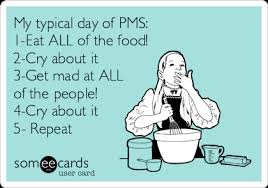PMS should stand for “Pardon My Scowl”
Affectionately termed “crazy day” by an ex, there was one day each month that I would turn into an uber sensitive, irrational, crazy person. Irritable, angry, sad – often all at the same time. The real crazy part was that I didn’t even know that I was acting crazy until the fog had cleared. Holler if you hear me, ladies!
PMS or premenstrual syndrome, describes a variety of symptoms occurring during the second half of the menstrual cycle, relieved by day 2 of menstruation. Most common symptoms include anxiety, depression, bloating, breast pain, headaches and fatigue….but there have been more than 150 symptoms associated with PMS!
4 main TYPES of PMS
| Subtypes | Characterized by… |
| PMS-A | Anxiety |
| PMS-C | Carb Cravings |
| PMS-D | Depression |
| PMS-H | Water retention |
What is associated with having PMS?
- existing anxiety and/or depression
- increased caffeine or alcohol intake
- smoking
- stress
- overweight/obesity
- diet
- specifically consumption of dairy, refined sugar, high sodium and lower nutrient food
- A study from the 80s reported that PMS patients consumed 62% more refined carbs, 275% more refined sugar, and 79% more dairy products than women without PMS.
Well the good news is this: Naturopathic Doctors are EXCELLENT at treating PMS (and many other female conditions, I may add). But here’s a bit about what I did to cure my PMS.
- Maintained a healthy diet and avoided inflammatory foods. This means fried foods, sugary foods, wheat/flour based products, dairy, and anything I knew I was sensitive to (for me this also meant eggs and soy).
- Took out the trash. I made sure hormones, like estrogen were being cleared out of my system properly. One great and EASY way to do this is by adding 2 tbsp of freshly ground flaxseeds to your daily diet. Plus, it’s a smart move to keep things movin’ (if ya know what I mean).
- I stopped taking the birth control pill. Now, don’t get me wrong, women on and off oral contraceptives can experience PMS. It’s understood that the relative amounts of hormones are more important than the absolute numbers. But for me, stopping this extra source of hormone ingestion was critical to changing the expression of symptoms around my period.
- Kept up with the exercise routine. Now I’ve fallen off the wagon here and there, just like everyone else…but the most important thing is to keep getting back on that horse. Exercise has been demonstrated to reduce PMS symptoms.
- Strategic supplementation. Supplements like B vitamins, calcium, magnesium, vitamin E, diindolylmethane, essential fatty acids etc. etc. can all help to reduce PMS symptoms. Consider seeing a Naturopathic doctor to learn what supplements might be right for you.
If you’re not quite ready to make these lifestyle changes, just try to warn your significant other or loved ones and take a personal day. In certain cultures, this time is celebrated instead of suppressed. “Moontime” is considered a time to honour a woman and her fertility. A time of creativity and renewed energy. A time to rest, be still with your thoughts, nourish yourself. So don’t be afraid to give your body what it needs.
Yours in health,
Dr. Natalie
Resources
Hudson, Tori ND. Women’s Encyclopedia of Natural Medicine. Alternative Therapies and Integrative Medicine for Total Health and Wellness. 2008.


